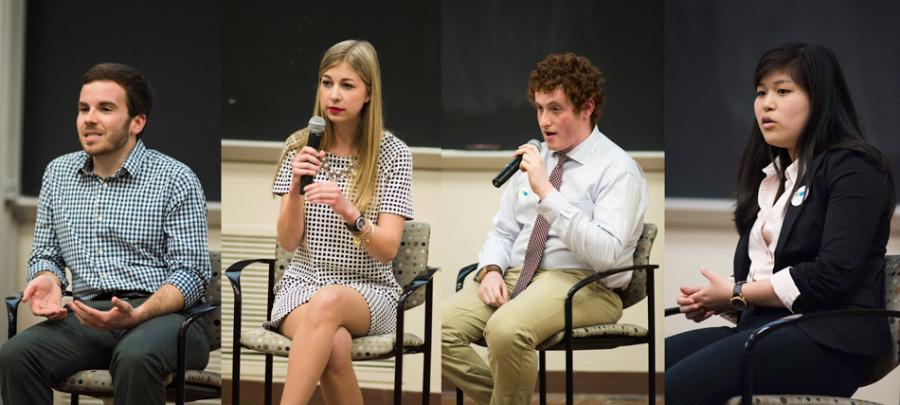Candidates share their visions for role of ASG
April 8, 2015
With polls opening in less than 48 hours, the two tickets for Associated Student Government president and executive vice president faced off in the second of two debates Tuesday, providing their visions for next year’s student government.
Weinberg junior Noah Star and his running mate, McCormick junior Christina Kim, faced Medill junior Haley Hinkle and her running mate, SESP junior Chris Harlow, in front of more than 60 students, many of whom are members of ASG.
Hinkle said the most important project in her platform to complete as president is creating a U.S.-based Social Inequalities and Diversities requirement in all six schools.
“We talk a lot about our campus culture of conversation,” Hinkle said. “A lot of students feel like this is a first step to ensuring that we give our students the language to talk about these things.”
Star, though, said in order to accomplish something like such a requirement, the structure of ASG must change so students outside the organization are better incorporated into its projects, a common theme throughout his “Listen Then Lead” campaign.
He alluded to a forum ASG held in February where students spoke in favor of the proposed requirement.
“The first step behind the first step with the U.S.-based inequalities distro requirement is creating a culture where we can fill this room when we hold forums,” Star said. “The reason why we did not fill it is because ASG as an organization is not doing its job meeting students where they are.”
As they did in Monday’s debate, both Hinkle and Star wouldn’t say whether or not they support the NU Divest-sponsored resolution that passed the Senate in February asking the University to divest from six corporations the resolution’s authors say violate Palestinian human rights.
Hinkle said she hasn’t decided which side she supports and that she wants to remain impartial for the time being.
“To be entirely honest, I’m still grappling with my understanding of this entire discussion at an international level,” Hinkle said. “When it comes to what would I have voted for in that debate, I personally don’t want to answer that question. … It’s very important to maintain a sense of neutrality in order to work with both sides.”
Star, who was Speaker of the Senate when the resolution passed, said he remained impartial to maintain the legitimacy of the debate. He said he studied other student governments where divestment resolutions were debated.
“In schools where the speaker, the person directly responsible for moderating the debate, was publicly partial, those debates did not go well,” Star said. “To give my perspective on the debate would invalidate the legislative decision and would put attention on me that’s completely unnecessary.”
Before Star and Hinkle squared off, Kim and Harlow fielded questions for about 45 minutes.
Harlow said his and Hinkle’s platform is rooted in achievable, tangible goals, goals that might appear underwhelming to some.
“Some people have told us that our platform kind of seems bland,” Harlow said, “but that’s because we know that we can get it all done.”
Kim, like Star, reiterated her campaign’s “Listen Then Lead” philosophy, a call to refocus ASG on individual “student experts” and student groups rather than try to provide leadership for every on-campus issue.
She said ASG is sometimes too insular and needs to engage with students outside student government in order to accomplish its goals.
“We feel like ASG isn’t providing as many opportunities as it should be,” Kim said. “Instead, it’s focused too internally. We really want to focus ASG more externally.”
The debate was sponsored by ASG’s Election Commission. The first debate was held Monday night and sponsored by Coalition of Colors.
Online voting begins Thursday at 5 p.m. and will be open for 24 hours. Results will be announced Friday night.
Email: [email protected]
Twitter: @Shane_McKeon


